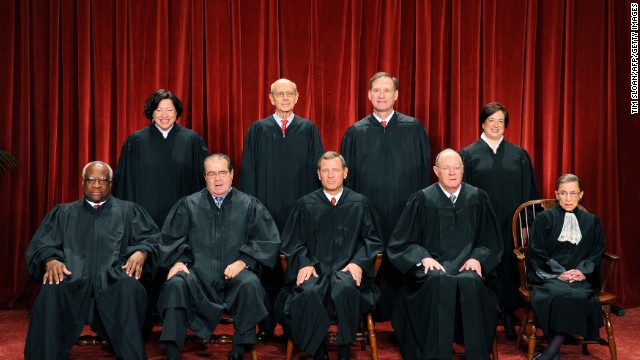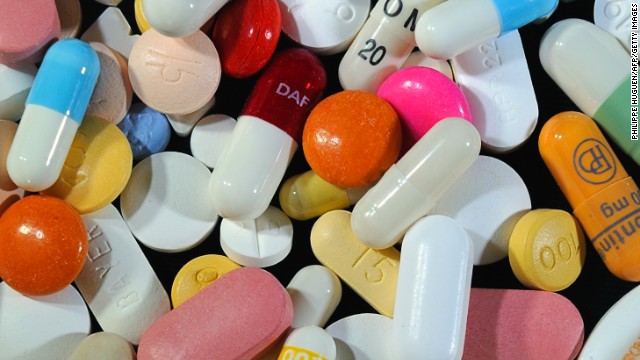Keith Jensen obtained the largest verdict in NH history and that case is before the U.S. Supreme Court
- Case involves woman who had a serious reaction to a generic drug
- Supreme Court reveals little about how it might rule in the case
- Generic drugs account for an estimated 80 percent of all prescriptions
- Drug company says it cannot comply with both federal and state demands

Generic drug safety argued at high court
By Bill Mears, CNN Supreme Court Producer
updated 9:05 AM EDT, Wed March 20, 2013
Washington (CNN) -- Karen Bartlett walked gingerly down the marble steps of the Supreme Court on Tuesday, guided on the arms of her lawyer. She is legally blind, the result of a serious reaction to a generic drug.
Her medical condition was debated before the justices, testing whether federal law prevents her multi-million-dollar "design-defect" judgment against the pharmaceutical company from standing up in state court.
A cautious bench revealed little about how it will rule in this closely watched case.

Photos: Today's Supreme Court
Generic drugs account for an estimated 80 percent of all prescriptions and patient-rights advocates say companies should be held accountable for unsafe, poorly made products regardless of whether they are brand name or generic.
That number is expected to rise in coming years with patent protection due to expire on several popular and lucrative consumer drugs, including Lipitor and Viagra.
The blockbuster health care reform bill championed by President Barack Obama would also encourage greater use of generics. About a third of generic drugs have no brand name competitors.
But Mutual Pharmaceutical counters it received Food and Drug Administration approval and that it cannot comply with both federal and state standards of care when it comes to drug safety and marketing.
The state jury "didn't say that 'yes, you can market this drug, it benefits 99.9 percent of the people, but there is that 0.1 percent, and you're going to have to compensate that person," said Chief Justice John Roberts. "They said the risks outweigh the benefits, period. So you should not market this at all. And that does seem inconsistent with the federal regime."
But Justice Elena Kagan suggested the company could be held responsible.
"We are not really dealing with generics; we are also dealing brand-name drugs," she said. "As to design [claims], don't the brand-name and the generics go hand in hand?"
Federal law requires generic drug makers to provide identical ingredients, warnings, and labels as brand-name products.
Bartlett suffers from Stevens-Johnson Syndrome, a lifelong debilitating disease that requires constant application of drops in her damaged eyes.
After complaining of shoulder pain in 2004, the New Hampshire woman was given a generic form of Sulindac, a non-steroid anti-inflammatory.
A rare hypersensitivity side-effect soon developed, causing her outer skin to burn and leaving open wounds on more than 60 percent of her body.
She was placed in a medically-induced coma for 100 days and suffered lung and esophageal damage.
Nine years and 12 surgeries later, Bartlett looked weak and needed help standing on the high court plaza after arguments.
A state court jury awarded her more than $21 million in compensatory damages, finding the generic was "unreasonably dangerous." Mutual eventually took its case to the high court.

This appeal is the latest the Supreme Court justices have wrestled with in recent years over liability from defective drugs. Most have turned on the tricky legal line between state and federal discretion.
Generic drug makers are trying to dismiss these kinds of design-defect lawsuits. They cite a 1984 congressional law pre-empting state "failure-to-warn" claims.
Drug companies have long asserted various doctrines of pre-emption, saying they are protected from most product-liability claims if they have met federal safety approval standards.
They argue that federal regulatory judgments trump state consumer safety laws, which are often tougher than Washington's standards.
But the high court had given a big victory to patients and consumer rights groups in 2009 when it ruled in favor of plaintiff who sued Wyeth -- now owned by Pfizer -- after losing an arm to gangrene from a common, brand-name anti-nausea prescription medication. She had won a $7 million judgment from a Vermont jury for her claims.
Then last year, the Supreme Court ruled 5-4 that generic drug companies do not share the same level of responsibility as makers of brand-name equivalents, to update their warning labels when significant new risks emerge.
The conservative majority noted that Congress, not the courts, could change the law if they wanted.
Bartlett's case goes beyond the so-called "failure to warn" standard and applies to the safety of the drug itself.
A federal appeals court in Boston ruled for Bartlett, calling her situation "disastrous." It concluded Mutual could have simply taken the drug off the market following scattered reports of dangerous side-effects.
The Obama administration backed the drug company, concerned that if state lawsuits are not pre-empted by federal law, that would reduce the incentive for generic drug makers to provide the most current safety information to the FDA, and affect patient care.
That sentient was echoed by lawyers representing the Philadelphia-based company.
"This is a situation where we had a $21-million-dollar verdict with respect to a drug that hundreds of thousands of people were taking at the time, and while it's true that about one out of a million had a terrible, terrible adverse reaction, hundreds of thousands are benefiting from the drug," Jay Lefkowitz told CNN after the argument.
"The drug was only selling about $6-7 million a year in gross sales. If you have more verdicts like this, they are going to take drugs off the market," he said.
The company also says it should be protected from such lawsuits because by law they are not allowed to change the product or its label.
But David Frederick, Bartlett's attorney, slammed the Obama administration's position that its regulatory judgment supersedes state courts "second-guessing" its expert, science-based authority.
"The federal government took a sweeping and unprecedented position today where it had taken no regulatory action and nonetheless asserted because it had information in its files, that that displaced state law," said Frederick. "I've been arguing cases in this court for a long time. I've never heard such a broad assertion of federal power."
A second separate case over generic drugs will be argued next week at the Supreme Court, dealing with so-called "reverse payment" agreements between competing generic and brand-name manufacturers.
As for Bartlett, she attended the morning arguments, but was reluctant to predict an outcome.
"I want generic drug makers to be held accountable for the harm they did to me and others," she told CNN. "The same as brand-name drugs."
A ruling is due by late spring.
The case is Mutual Pharmaceutical Co. v. Bartlett (12-142).
 Photos: Today's Supreme Court
Photos: Today's Supreme Court




